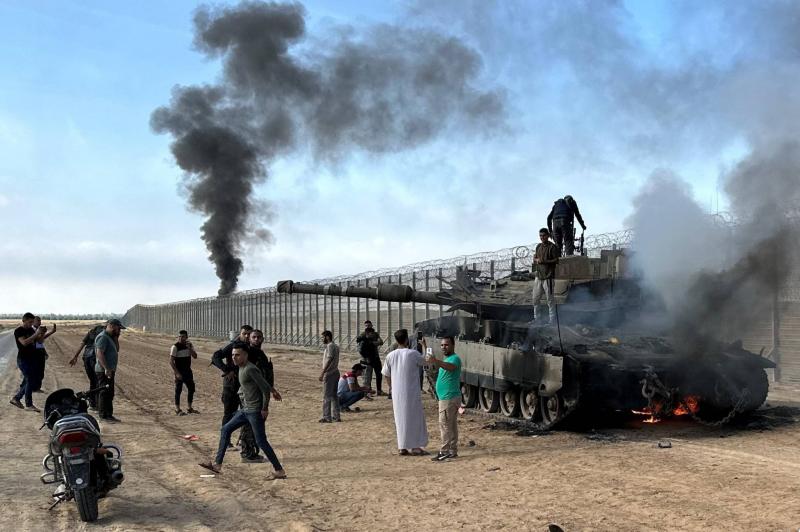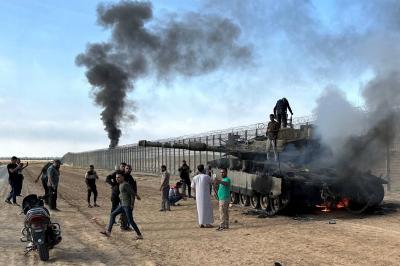There is currently no alternative, at least for now, to military action and the use of force between Hamas and Israel. Both parties aim for maximal political gains (Maximalists). If politics is the art of the possible, and war is fought to serve political objectives, then maximum demands will inevitably negate politics in its essence. Politics is about give and take, progress and retreat, making concessions, and presenting them as gains. This happens during negotiations, whether direct or indirect. This introduction doesn’t enter the vocabulary of either "Hamas" or the Israeli government at the moment. The war between them is sustained under the motto "the weak fights with what they have, and the strong strikes with all they have."
The roles have today reversed between Hamas and Israel. Historically, Gaza was the battlefield between David and Goliath, according to Jewish historical narratives. David, the Israeli, was the weak one, versus the mighty Palestinian Goliath. According to the story, David defeated Goliath with a decisive blow to his forehead using his slingshot. Military experts classify this incident as the war between the strong and the weak. The weak always has a chance to emerge victorious or, at the very least, to prevent the strong from winning. It’s a prime example of asymmetric warfare.
Today, the script has flipped. In the same geographical location, Gaza, Hamas has become David, and Israel has become Goliath. However, the conclusion of their conflict is not as in the religious story, i.e., with a single blow.
Following the Israeli withdrawal from Gaza in 2005, under Ariel Sharon, Israel has carried out about five military operations against the strip. The most difficult of these was in 2014. In this operation, termed "Protective Edge," Israel entered the geographical boundaries of the strip to destroy tunnels and establish a buffer zone.
In all Israeli operations in Gaza, and the Palestinian responses, rockets, airplanes, drones, and assassinations of Palestinian leaders have been the prevalent pattern. The further the reach of Hamas's rockets within occupied Palestine and the more Israeli air defenses fail to intercept these rockets, the more this is seen as a success for Palestinian resistance. This was the measure of success, or the Palestinian theory of victory.
In terms of timing, the operation coincides with Jewish religious holidays and marks the 50th anniversary of the October 1973 war. While the October war relied on deception to achieve a strategic surprise factor, the "Al-Aqsa Flood" operation, as reported by Al-Sharq Al-Awsat newspaper, falls within this framework, even if there is a significant difference between the two in terms of scale and geopolitical implications.
For Hamas to launch nearly 5,000 rockets (according to some reports, 7,000 rockets) of various types indicates that this Palestinian movement possesses significant logistical depth. Perhaps Hamas deliberately chose to launch this amount of rockets to overwhelm Israeli air defenses in preparation for a ground operation that was unexpected by the Israeli army, including its intelligence.
While Hamas had previously responded with rocket fire from within the strip, the "Al-Aqsa Flood" operation focused on new dimensions, primarily: alongside rocket fire, the deployment of paratroopers onto settlements, and most importantly, the attempt to gain control of land within occupied Palestine.
If this operation has surprised Israeli security agencies, this constitutes an important achievement in the process of deception. Did Sun Tzu not say, "All warfare is based on deception"?
The complexities and scale of this operation may indicate that preparations for it had begun long ago. The preparation and planning involved three dimensions: land, air, and sea, suggesting that Hamas had managed to fight in a combined manner. Thus, Hamas's ability to maintain secrecy over the preparations for this operation was notable.
The following slogan applies to the relationship between Hamas and Israel: "Hamas wins if it does not lose, and Israel loses if it does not win." Therefore, the mere execution of the operation is enough for Hamas to consider itself victorious, at least from a short-term perspective, and not in the long term, which will become clear after assessing the Israeli response.
Fighting Hamas within Israeli settlements could mean neutralizing Israel's most significant military power from participating in the conflict, namely the air force, which is already struggling due to the internal Israeli situation.
David Ben-Gurion, the founder of Israel, defined the strategic principles of the Hebrew state, the most important of which is to end the war with the enemy quickly, because Israel cannot withstand prolonged wars of attrition. Ben-Gurion also advised waging war on enemy ground. Today, Hamas's operations are taking place inside Israel.
The “Al-Aqsa Flood” operation will undoubtedly reach its maximum extent. Accordingly, Israel will prepare for a counter-operation after determining the next operational area, which extends 80km into Israel from the border of the strip. Israel will likely aim to achieve the following:
- Quickly regain the initiative after assessing the field situation, gathering tactical intelligence, and estimating the situation to deploy appropriate forces (both in type and number).
- Retrieve settlements where Hamas elements are present while making a concerted effort not to allow Palestinian elements to withdraw with military or civilian captives.
- Work to promptly restore the deterrence image after the fragility of internal national security has become apparent.
However, restoring the deterrence image will require a very large military operation far exceeding what the "Al-Aqsa Flood" operation accomplished. Will Israel proceed to invade the strip? The picture is unclear, but an invasion would require:
- A long time to complete the operation, noting that Israel does not possess the luxury of time.
- The necessary resources, including financial and human costs.
In the event that an invasion of the strip succeeds, if it succeeds, who will govern the strip?
When Israel considers a response to restore its deterrence image, it is also contemplating the Syrian and Lebanese fronts. Will the response be external alongside the internal one?
In conclusion, it can be said that what has occurred in recent hours will change Israel's view of its national security, how it deals with everything related to the Palestinian cause, and how it addresses regional issues. What option will the Hebrew state adopt now after its security fragility has been exposed? The answer may not take long to emerge.




